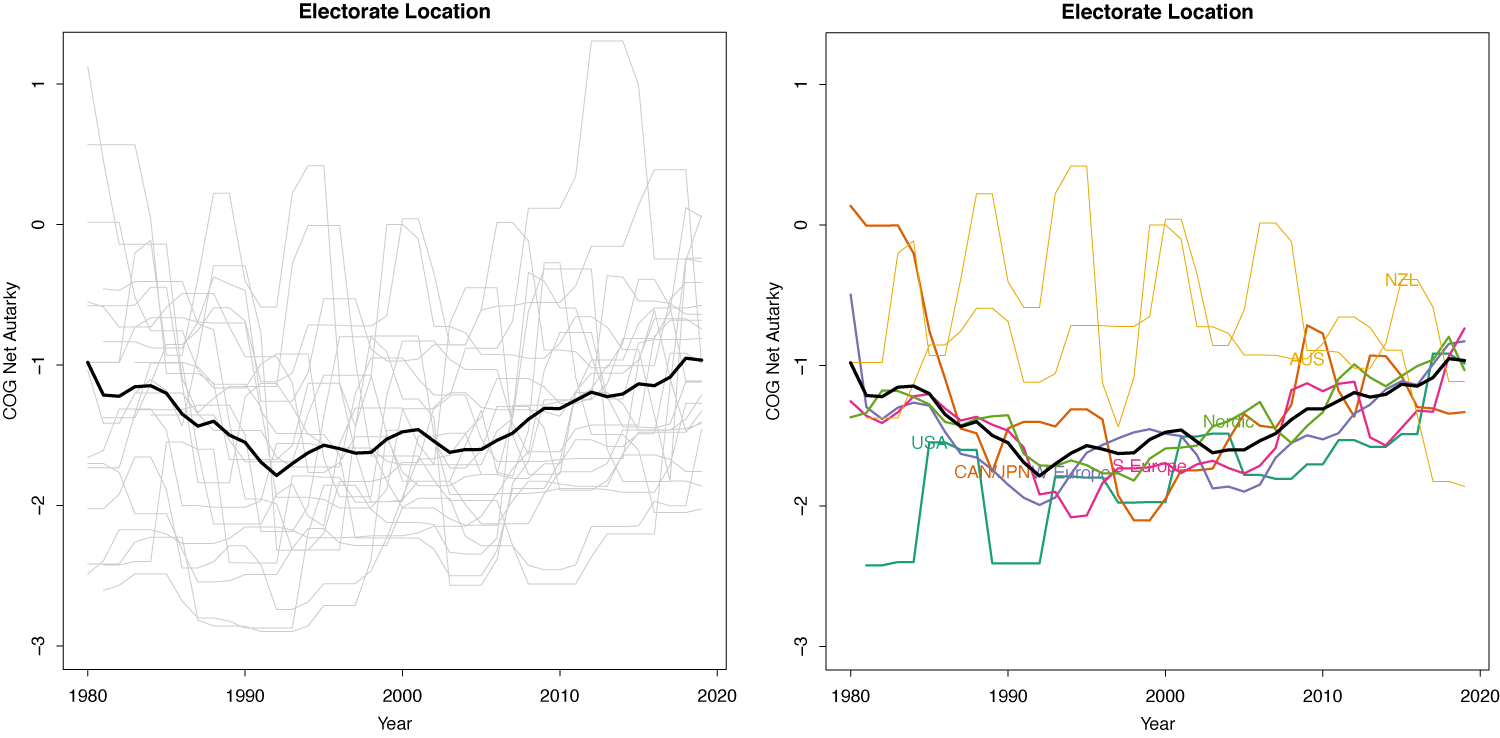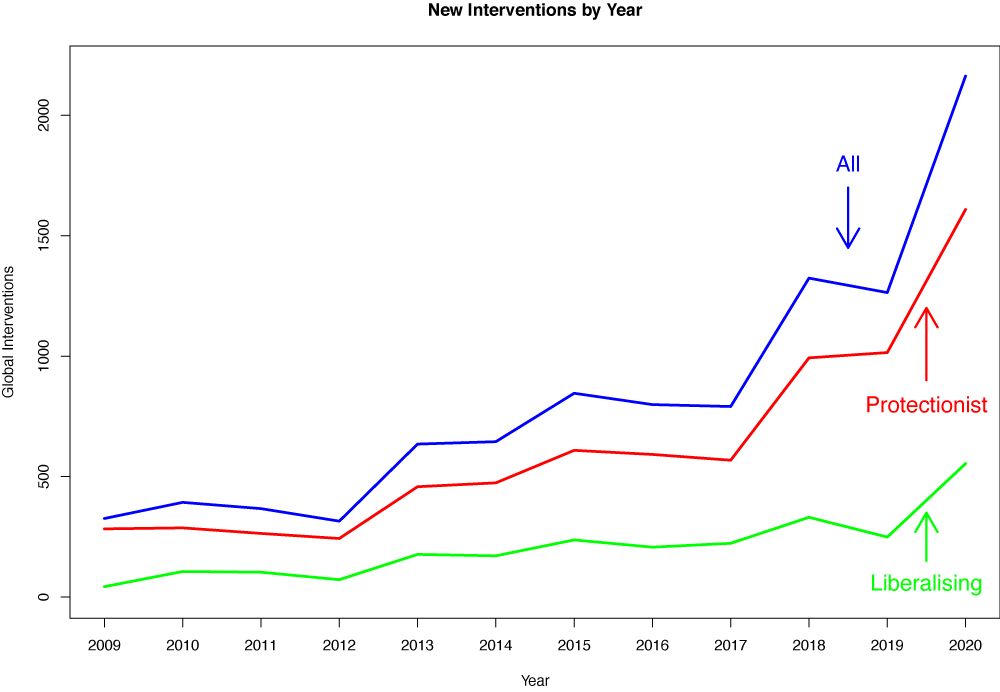A lively discussion has flourished around the recent surge of populist parties across advanced democracies (Guriev and Papaioannou 2021). Several contributions have been hosted on a dedicated VoxEU debate (among the earliest were Rodrik 2019, Tabellini 2019, Eichengreen 2019, Colantone and Stanig 2019, Pastor and Veronesi 2019, and Margalit 2019). One of the most salient phenomena related to the populist wave is the ‘globalisation backlash’. In our recent paper (Colantone et al. 2022), we characterise this phenomenon as the political shift of voters and parties in a protectionist and isolationist direction, with substantive implications for governments’ leaning and enacted policies. We provide descriptive evidence on the backlash along these lines and discuss its theoretical underpinnings within standard trade models. Finally, we review the evidence on the drivers of the backlash. In this respect, globalisation emerges as a relevant factor by means of the distributional consequences entailed by rising trade exposure. Yet, the backlash is only partly determined by international trade. Other factors – such as technological change, immigration, crisis-driven fiscal austerity, as well as cultural concerns – are found to play a similar role in driving the observed political shift. Borrowing from the medical literature, we describe this multi-causal nature of the phenomenon through the concept of ‘co-morbidity’, by which different factors compound to generate the backlash.
Documenting the backlash
To document the globalisation backlash, we employ newly assembled data for 23 industrialised, advanced democracies, spanning Europe, North America, and Asia. The analysis covers the period 1980-2019. We start by providing descriptive evidence on the backlash in terms of voting behaviour. Specifically, Figure 1 displays the electorate location in terms of protectionism and isolationism. For each country, in each national election, this is obtained by combining two ingredients: (1) the vote share of each party; and (2) an ideology score, called Net Autarky (Burgoon 2009), which reflects the stance of each party with respect to trade policy and multilateralism, based on party manifesto data (Volkens et al. 2020). The electorate location is then computed as a weighted summation of party scores, using vote shares as weights. It is essentially the ideological centre of gravity (COG) of the electorate. The left panel reports all countries (grey lines) along with the cross-country average (dark line). The right panel highlights specific countries, such as the US, or groups of countries, such as southern, western, and northern Europe. Looking at the grand mean, there is a visible decline from the beginning of the 1980s until the early 1990s. This globalist wave is then followed by a protectionist shift from the mid-1990s onwards. Such a pattern is clearly detectable across most countries. The only exceptions seem to be Australia and New Zealand, that start from relatively high levels of net autarky, and display a decline in recent years. Very similar evidence is obtained when looking at the ideological location of legislatures and executives. This suggests that the shift in voting behaviour has been consequential for the composition of decision-making bodies.
Figure 1 Electorate location
Note: Both panels report figures referring to the electorate centre of gravity in terms of net autarky scores. In the left panel, the light grey lines refer to each single sample country; the black line is the cross-country average. In the right panel, we display separately specific countries and groups of countries in different colours; the black line is the cross-country average.
Source: Colantone et al. (2022).
A protectionist shift is also detectable in terms of trade policy developments. In this respect, there are many recent cases in point, ranging from Brexit to the US-China trade war and the stall of the WTO Appellate Body. More systematic evidence is shown in Figure 2, based on Global Trade Alert data, according to which protectionist trade policy interventions have been growing faster than liberalizing ones from the financial crisis onwards. Yet, besides such dynamics, more trade-friendly developments can also be observed. For instance, the number of active regional trade agreements (RTAs), and especially free trade areas (FTAs), has kept growing even after the financial crisis. In parallel, average tariffs have kept declining over time. However, temporary protection measures such as anti-dumping and countervailing duties have been increasingly activated, and with rising ad-valorem rates, entailing stronger protectionist effects. Overall, the evolution of trade policy seems consistent with the political dynamics described above. The picture gets instead more nuanced as we look at individual attitudes. We do not find systematic evidence of a generalised worsening in public opinion towards globalisation. However, large minorities, and in some cases strong majorities, of survey respondents believe they are not actually benefiting from international trade (e.g. 39% in the US and 60% in Italy).
Figure 2 Rise in protectionist measures since the financial crisis
Note: The green line displays liberalising interventions, the red line protectionist interventions, the blue line is the sum of all interventions.
Source: Figure taken from Colantone et al. (2022), based on Global Trade Alert data.
Economics of the backlash
From a theoretical perspective, we discuss how the backlash may arise within standard trade models when taking into account the ‘social footprint’ of globalisation in terms of trade-induced inequality and foregone positive externalities from ‘strategic industries’. As for trade-induced inequality, the general message of the Ricardo-Viner and Heckscher-Ohlin models is that trade liberalisation produces winners and losers, whose identity may vary in the short versus the long run. Intuitively, in the long run, owners of factors that are used relatively intensively in shrinking import-competing activities (e.g. low-skill labour) lose from trade liberalisation. Conversely, owners of factors that are used relatively intensively in expanding export activities (e.g. capital or high skill labour) win. In the short run, even long-run winners may lose to the extent they are trapped in shrinking activities and the transition to expanding industries is not immediate/costless. In light of these models, trade liberalization is likely to be opposed by the owners of factors who lose, thus fuelling globalization backlash.
Abstracting from inequality issues, and adopting a Ricardian setup featuring only one factor of production, a globalisation backlash may still emerge when trade liberalisation leads to shrinkage of strategic industries. These are industries that generate positive economy-wide externalities, ranging from technological spillovers to consumption amenities, such as those originating from industries that contribute to national security, and those resulting from cultural aspects such as workers’ identity and dignity. In the presence of externalities, a benevolent government might not target free trade as the optimal outcome; hence, if the inherited degree of trade freeness is higher than the optimal one, a protectionist backlash in trade policy may be observed. Moreover, a politically biased government may target a degree of trade freeness that is based on an ‘unfair’ aggregation of individual attitudes with respect to trade, as related to potentially different personal assessments of the pains from trade. If social groups that are more negatively affected by the loss of externalities are weighted less than proportionally by the government, a political backlash is likely to eventually emerge.
Drivers of the backlash
What are the drivers of the globalisation backlash? A large literature has developed in recent years around this broad research question, investigating both economic factors and cultural determinants. Several studies have emphasised the role of trade, focusing particularly on exposure to surging imports from China between the early 1990s and the financial crisis. Regions more exposed to the ‘China shock’, owing to their historical industrial specialisation, have been shown to be negatively affected in many ways, ranging from higher unemployment, lower labour force participation, increased use of disability and other transfer benefits, reduced wages, as well as lower provision of public goods and worsening health conditions (see Autor et al. 2013 for the first contribution). This phenomenon has had political repercussions as well, leading to rising support for protectionist, isolationist, and nationalist parties and candidates (e.g. Autor et al. 2020 for the US and Colantone and Stanig 2018 for Europe). The available evidence allows one to conclude that the globalisation backlash is thus endogenous to globalisation itself. However, other factors have been found to tilt electorates in similar ways. In particular, technological progress, by means of automation of production through robots, has been shown to generate distributional consequences that are akin to those of trade, leading to similar political responses (e.g. Frey et al. 2018 for the US and Anelli et al. 2021 for Europe). The same holds true for crisis-driven fiscal austerity as well as immigration, which acts both as a catalyst of structural economic grievances, and as a direct determinant of political backlash.
Conclusion
Overall, it seems that globalisation is at stake due partly to reasons that are not strictly related to trade. The political sustainability of globalisation – and arguably of the international liberal order – will depend on how successful society is at managing in a more inclusive way the distributional consequences of structural change.
References
Anelli, M, I Colantone, and P Stanig (2021), “Individual vulnerability to industrial robot adoption increases support for the radical right”, PNAS - Proceedings of the National Academy of Sciences, forthcoming.
Autor, D H, D Dorn, and G H Hanson (2013), “The China syndrome: Local labor market effects of import competition in the United States”, American Economic Review 103(6): 2121-2168.
Autor, D H, D Dorn, G H Hanson, and K Majlesi (2020), “Importing political polarization? The electoral consequences of rising trade exposure”, American Economic Review 110 (10): 3139-3183.
Burgoon, B (2009), “Globalization and backlash: Polanyi’s revenge?”, Review of International Political Economy 16(2): 145–77.
Colantone, I and P Stanig (2018), “The trade origins of economic nationalism: Import competition and voting behavior in Western Europe”, American Journal of Political Science 62: 936-953.
Colantone, I and P Stanig (2019), “Heterogeneous drivers of heterogeneous populism”, VoxEU.org, 10 December.
Colantone, I, G I Ottaviano, and P Stanig (2022), “The backlash of globalization”, CEPR Discussion Paper 16521, forthcoming in G Gopinath, E Helpman, and K S Rogoff (eds), Handbook of International Economics 5, Elsevier.
Eichengreen, B (2019), “The Two Faces of Populism”, VoxEU.org, 29 October.
Frey, C B, T Berger, and C Chen (2018), “Political machinery: Did robots swing the 2016 US presidential election?” Oxford Review of Economic Policy 34(3): 418-442.
Guriev, S and E Papaioannou (2021), “The political economy of populism”, Journal of Economic Literature, forthcoming.
Margalit, Y (2019), “Economic causes of populism: Important, marginally important, or important on the margin”, VoxEU.org, 20 December.
Pastor, L and P Veronesi (2019), “Populism: Why in rich countries and in good times”, VoxEU.org, 12 December.
Rodrik, D (2019), “Many forms of populism”, VoxEU.org, 29 October.
Tabellini, G (2019), “The rise of populism”, VoxEU.org, 29 October.
Volkens, A, T Burst, W Krause, P Lehmann, T Matthiess, N Merz, S Regel, B Wessels, and L Zehnter (2020), “The Manifesto Data Collection”, Manifesto Project (MRG/CMP/MARPOR), Version 2020b, WZB.








